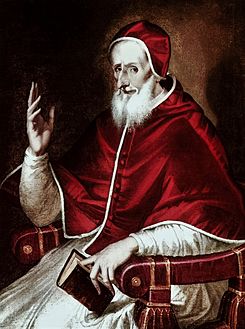1570
Pius V excommunicates Elizabeth I
Elizabeth I succeed to the throne of England in 1558, following the death of her half-sister Mary who had reunited the English church to Roman Catholicism. The Elizabethan Church Settlement reversed Mary’s policy and established a Protestant church with the Queen as Supreme Governor. The open practice of Catholicism was banned but the government made little effort to root out private nonconformity. This moderation plus Elizabeth’s cynical marriage negotiations with Continental princes kept Catholic Europe at bay for over a decade.
This situation changed when Catholic opposition broke out into the open with the 1569 revolt of the northern earls. Rome-leaning nobles also conspired to put Mary Queen of Scots on the throne. Hoping to aid the English Catholic cause, Pope Pius V excommunicated Elizabeth and in the bull Regnans in Excelsis absolved subjects of their allegiance to the queen. Elizabeth, said the pope, was a “pretended queen of England and the servant of crime [who] . . . seized the crown and monstrously usurped the place of supreme head of the Church in all England to gather with the chief authority and jurisdiction belonging to it [and] once again reduced this same kingdom – which had already been restored to the Catholic faith and to good fruits – to a miserable ruin.”
We charge and command all and singular the nobles, subjects, peoples and others afore said that they do not dare obey her orders, mandates and laws. Those who shall act to the contrary we include in the like sentence of excommunication.
This was enormously maladroit. By the time the bull was promulgated the Northern Rebellion had been defeated and the leaders fled into Scotland or the Continent. The lasting effect of the bull was to encourage an even harder policy toward Catholic subjects and to convince patriotic Englishmen that Catholicism meant foreign influence and tyranny.
This was a rare mistake by an otherwise astute pope, now considered a saint by the Catholic Church.
